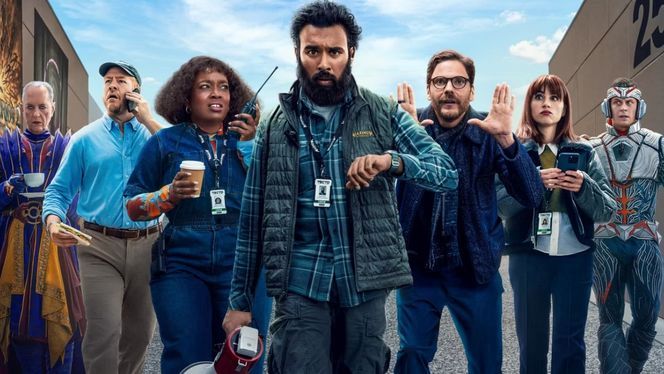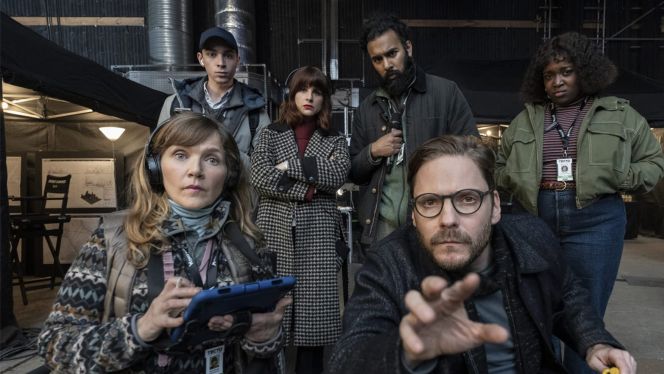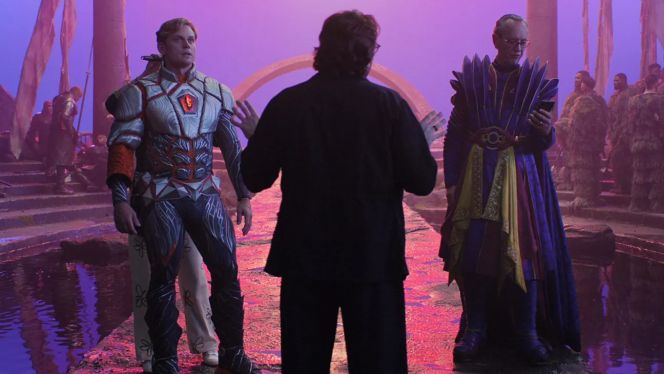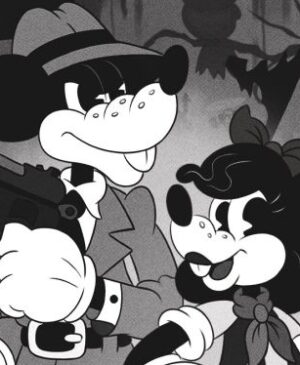SERIES REVIEW – Can you believe that creating a superhero film is actually an enormous task? Yes, probably, if you’ve ever looked beyond the cheerful Comic-Con announcements that hail these movies as the greatest works in the world. However, in HBO Max’s series The Franchise, the production of a smaller film called Tecto faces serious difficulties: directors are constantly getting fired, scripts are rewritten over and over, and no one can decide whether the film is feminist or sexist. The omnipotent figure leading the entire project is always making bigger promises to the audience while continually changing the details behind the scenes.
It’s evident that we are witnessing something akin to the Marvel Cinematic Universe, with a touch of DC and Star Wars thrown in. Although the creators of the series (Jon Brown from Succession; Armando Iannucci, who lampooned politics in Veep and The Thick of It; and director Sam Mendes, who has experience in the James Bond franchise) claimed in interviews that the events were based on real filming stories, the initial depiction in The Franchise leans more towards typical archetypes rather than unexpected surprises.
Behind a Chaotic Shoot
Daniel (Himesh Patel from Station Eleven) is a diligent first assistant who strives to hold the film together despite the general chaos caused by the stars. Billy Magnussen plays the dim-witted lead, who has taken so much HGH (human growth hormone) that he believes he is turning into a sheep. Richard E. Grant portrays the sardonic, politically incorrect British actor who is only here for the paycheck. This is further compounded by the director (Daniel Brühl), who becomes a source of ridicule due to his obsession with scarves, which Vulture may deserve a little credit for, and the screenwriter (Jessica Hynes), a perpetual yes-woman whose character takes time to come together.
On the studio side, Darren Goldstein plays a loud management stooge under a baseball cap. Although the universe’s Kevin Feige equivalent, “Shane,” never appears, his messages are conveyed by a harried assistant played by Isaac Powell. Powell shines as a heartthrob on stage but only plays a functionary on TV. Producer Anita (played by Aya Cash) arrives to steer the troubled production across the finish line, although she sees this only as a stepping stone to more serious films. She has a romantic history with Daniel, a complication that the show struggles to manage, often leaving it aside. The pilot opens with the arrival of Daniel’s new second-in-command, Dag (played by Lolly Adefope), who provides a somewhat stiff expository voice. Later, her lines become funnier, although her detached observations have yet to coalesce into a fully realized character.
As the Tecto crew embarks on another filming week, The Franchise presents complications familiar to those of us who follow how the “sausage” is made (this may be the first series explicitly designed for listeners of The Town). Yet, it struggles to find the twist that would truly elevate the satire. In one episode, clearly inspired by the public scrutiny of actresses like Brie Larson in Captain Marvel, the studio decides that after being accused of sexism, they need to give the female lead of Tecto (played by Katherine Waterston) more power, only to discover that any deviation from comic book lore could make hardcore fans even angrier. This sets up a great premise leading to a funny scene where Daniel and his team argue about what kind of device they can, contractually, give Waterston’s character without angering the other agents. Anita even suggests they could call in a woman named “Annie Herzog” to do a script pass for publicity, which serves as a clever inside joke for fans of playwrights.
These Heroes Are Familiar
While The Franchise finds comedy in the superhero machine, it struggles to figure out how to escalate the situation and often goes in circles. One would expect these characters to intensify and heighten the scenarios, but they too often remain type characters: the beleaguered first assistant, the indifferent producer, and the misguided director all say exactly what we expect them to. Waterston’s character, in particular, suffers from a lack of good comedic material; she is polite, sad, and trying very hard to leave the franchise in peace. Perhaps there’s a meta-failure in putting the actress on a pedestal but not allowing her to be as much of a megalomaniac as the others.
Daniel could also be a bit crazier. Brown and Iannucci position Patel as one of the saner men in the room, yet he is also the only character who genuinely seems to care about the comic books on which Tecto is based. This forces Patel to play, in some scenes, the bureaucratic cynicism of a filmmaker lying to everyone to get things done, while in others, he must portray the geekiness and enthusiasm about what might be possible if not for all the meddling from above. This is a tall order for any performer, even someone as inherently relatable as Patel. Furthermore, with the rest of the cast in The Franchise falling on the cynical side of the filmmaking business, there’s an ingredient imbalance in the comedy recipe. The satire needs someone who truly believes in Tecto besides the conflicted lead character, even if it’s obviously a ridiculous movie about a guy who can cause earthquakes with an invisible drill. In 30 Rock, there was Kenneth, and in Veep, there was Gary. Outside of this character type, the arrogance of The Franchise lacks a proper counterbalance. If Daniel is the only one who genuinely cares about superheroes in The Franchise, it’s hard to believe he makes indifferent decisions, such as regarding the shaving of a background actor’s body hair just a week before his wedding.
Chinese Tractors and Superheroes
But comedy takes time to gel, and as The Franchise progresses, it loosens up, allowing the characters to find more emotional depth and introduce a more playful, humorous tone that rewards the actors and the events unfolding in the universe. One episode centers on the ways American productions adapt to Chinese markets, in which the Tecto team attempts to sneak in propaganda praising the quality of Chinese-made tractors into their sci-fi film. The satire, as always, could be sharper—there are no references to the censorship of homosexuality or Uyghur labor camps—but The Franchise still conjures up some great, absurd tableaux where tractors beep their way through soundstages.
Later episodes increasingly encourage the characters’ charming absurdity: Magnussen excellently balances the matinée idol appearance with an endearing fragility (he has a hilariously funny line about how his father only talks to him when rating his films two stars on Letterboxd), while Brühl, often relegated to playing Nazi types in American films, proves to excel at portraying the awkwardness of an indoor bookworm (he spends an entire episode fretting over whether Christopher Nolan, who visits the set for the day, will like his giant fireball).
The show shines when it shifts away from characters constantly asserting they’re better than the garbage they’re shoveling, instead reveling in that very garbage. That’s when they become people you actually enjoy spending time with. The series finds a lot of joy in Superstore-like cutaway scenes where the crew members clown around between sets—especially harrowing are the shots of the props team spray-painting increasingly gigantic gems to please Brühl’s director—and later in the season, there are some perfectly timed subplots, like Powell’s assistant trying to wrangle a Kívánság Alapítvány visitor who turns out to be a grown man dealing with long COVID. Daniel’s character starts to function better as he becomes more actively Machiavellian, and Patel becomes significantly more engaging when a wild glint appears in his eye. This also livens up his interactions with Cash, even if she is often forced to mumble in disappointment about how she shouldn’t be there because she has a master’s degree in literature.
-Gergely Herpai „BadSector”-
The Franchise
Direction - 7.2
Actors - 7.4
Story/Humor - 7.6
Visuals/Music/Sound - 6.8
Ambience - 7.1
7.2
GOOD
The Franchise increasingly finds its voice as it progresses, and it is the absurdity of the characters that truly makes it enjoyable. Magnussen and Brühl’s performances are particularly outstanding, and the series satirically yet entertainingly showcases the chaotic world of filmmaking. As the characters sink deeper into this mad world, viewers also become more engrossed in the story.








Leave a Reply